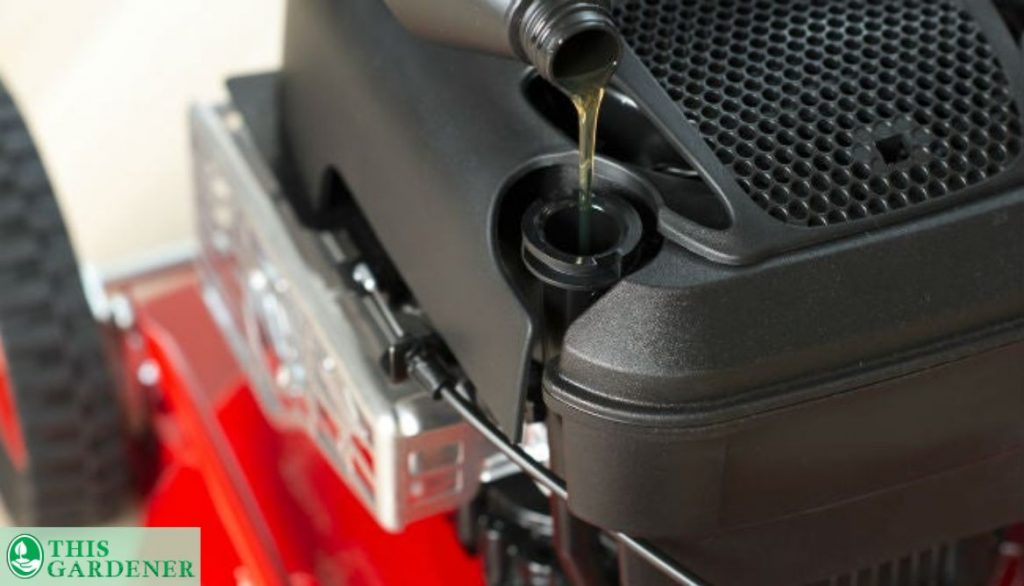If you are an owner of a lawnmower, then you may have always wondered that “can you use car oil in lawn mower“. This myth has always been a big discussion starter if it can be replaced with small engine oil or oil for four-stroke engines.
Although there are oils specifically available for lawnmowers at times you might need to use the mower and have low oil levels on the machine. What to do then? Pour in a combative oil used in cars. Problem solved!
The answer to this myth and long-awaited mystery has been cracked. And you will be surprised to find out the revealing facts and information. Let’s get started!
Contents
Can You Use Car Oil In A Lawn Mower?

If you have an old two-stroke engine then you need to use a special type of oil for it. If you will use car oil then ash or combustion deposits will choke the engine. But if you have a four-stroke engine then you can use some high-quality oil for it.
Typically, SAE-30 or 10W-30 type of car oils can be used for some four-stroke lawnmowers. You cannot use low-grade oils or else it will either damage the mower’s engine or seize the mower’s engine.
What Oil Should I Use for Two-Stroke And Four-Stroke Lawn Mower Engines?
These are some of the best oil brands to use for a two-stroke engine:
Similarly, for a four-stroke engine, these are the best oil brands:
Two-Stroke Engine Oil Types
Two-stroke engine oil types can be classified into three categories:
- 2T oil: a type of motor oil specially designed to be used in a crankcase compression engine.
- Two Stroke oil: a specially designed engine lubricant used for a two-stroke engine.
- Two Cycle oil: Used in two-stroke engines, this type of oil contains additives that help during the burning process of the oil with the gasoline.
Four-Stroke Engine Oil Types
Four-stroke oil types can be classified into three categories:
- Synthetic oil: it is a man-made lubricant that possesses chemical compounds which are artificially made.
- Mineral oil: these types of oils are naturally found in the environment and can be refined to remove wax or impurities. They are also called petroleum oils.
- Semi-Synthetic oil: it is a mix of mineral and synthetic oil in precise proportions to provide a boost in its properties with bumping up the cost a lot.
Two-Stroke and Four-Stroke Small Engine Oil Versus Car Oil
Two Stroke Oil | Four Stroke Oil | Car Oil | |
Temperature Range: | Very High Temperatures above 250 Degrees | Average Temperature below 200 Degrees | Average Temperature above 150 Degrees |
Efficiency: | Average | Bad | Good |
Functionality: | Fuel and oil mix for use | Oil and fuel are separated in reservoirs | Oil and fuel are separated in reservoirs |
Environment Friendly: | Burns oil and fuel both. Not every environmentally friendly | Better than a two-stroke | Efficient than a two and four-stroke |
Cost Effectiveness: | Low | Average | Pocket-Friendly |
Compatibility: | Small Engines | Average-sized diesel and gasoline engines | Average and large sized diesel and gasoline engines |
Additives: | Fewer additives than four-stroke or oil used in car | Has fewer additives than oil used in car | Contains numerous additives |
What is the Best Car Oil to use in My Lawn Mower? (What is the best type of automotive lawnmower oil?)

The best car oil that can be used in your lawnmower is the 5W-30 motor oil. It performs exceptionally in cold and hot weather while providing a sufficient viscosity level for the engine to work with.
Can You Use 10W30 Car Oil in a Lawn Mower?
This type of car oil may be suitable for some models of lawnmowers but not for all. Check the user manual to be sure which oil to use.
Can You Use 5W30 Motor Oil in a Lawn Mower?
Affirmative, you can use this type of synthetic oil and it gives the machine protection against high temperature as well as corrosion.
What Oil Can You Use In a Lawn Mower?

Some suitable oil types for your lawnmower can be listed as follows:
- SAE 30: Formulated with a viscosity rating of 30, it is for small air-cooled engines.
- SAE 10W-30: A versatile oil type suitable for various cold and higher temperatures ranges.
- SAE 5W-30: A better flowing and low viscosity oil suitable for colder temperatures but also protects the engine from heat.
- Synthetic SAE 5W-30: A multifunctional oil that performs well in cold and warmer temperatures.
- Vanguard 15W-50: A rather unique commercial-level oil that is fully synthetic and compatible with different temperatures that range from 20 to 130 degrees.
Is It Okay To Put Synthetic Oils in a Lawn Mower?
Using synthetic oil in a lawnmower has always been a controversial topic among users. Some users have reported having experienced average or above-average performance while some argue that it causes damage to the machine.
For now, we can state that you can use synthetic oil for your lawnmower without worry!
Is Car Oil the Same As Lawn Mower Oil?
We can generally say that they are similar but oils used for cars and lawn mower oil are not the same. They are different in their own way. The additives found in lawn mower motor oil are extremely different from car oils.
The majority of Lawn mowers have small engines and they are sensitive to additives found in the oil used for cars. Thus, two different types of oils exist.
Oil For Four-Stroke Lawn Mower
The best type of engine oil used for a four-stroke lawn mower is synthetic 5W-30 motor oil. It is specially designed to protect your machine from high temperatures as well as wear and tear. The best engine oil brand for such an engine is STP Premium Small Engines 4-Cycle Oil SAE-30.
Oil For Two-Stroke Lawn Mower
Two-stroke lawn mower engines are smaller and need very specific oil requirements to work well. The engine oil for this type should be able to provide maximum lubrication. The best brand for this type of engine is Husqvarna HP SYNTH 2-CYC OIL 2.6OZ.
Should I Add Additives to Lawn Mower Oil?
You may add additives if your lawn mower model is not sensitive to it. Some lawn mowers parts are highly sensitive to additives. So, it might not be recommended to use additives.
Ways in which an additive can help are:
- It helps to maintain the viscosity of the oil at low or high temperatures.
- Fights against engine deposits and helps with the combustion process.
- Helps adjust to different ranges of temperatures.
- Acts as an engine cleaner.
How Often Should You Change Lawn Mower Oil?
A lawn mower engine needs motor oil changes depending on the grade of motor oil being used, brand of oil, and duration of use on regular basis. On average, lawn mowers will need a change of oil after 20 to 50 hours of use.
It all depends on the type of engine (e.g. air-cooled engines, four-stroke engines, two-stroke engines, etc) you have on a lawnmower.
Here are some reviews of users and manufacturers as to when to change the oil. Check it out!
Toro Manufacture "The truth is engine oil doesn’t last forever. The heat, dirt and agitated air in your engines crankcase gradually make the oil dark and dirty. Over time, oil loses the ability to coat and protect vital engine parts. That’s why Toro recommends changing the engine oil in your Zero Turn Mower after 100 hours of operation and after the first five hours for new mowers."
User akwakeboarder "Manual typically prescribed oil changes based on hours of operation or annually. I think my Honda says to change every 30 hours"
User msparks "OIL RECOMMENDATIONS All-season KOHLER® PRO 10W-50 Synthetic Oil is the ideal oil for KOHLER engines. It is specifi cally formulated to extend the oil and oil fi lter change interval to 300 Hours when paired with a KOHLER PRO Extended Life Oil Filter. 300-Hour oil and oil fi lter change intervals are exclusive to and only authorized on KOHLER engines that utilize both the KOHLER PRO 10W-50 Synthetic Oil and KOHLER PRO Extended Life Oil Filter. Alternative engine oils and oil fi lters may be used with KOHLER engines but require 100-Hour oil and 200-Hour oil fi lter change intervals for proper maintenance."
Tips For Changing The Oil In Your Lawn Mower
Changing the oil of the lawn mowers is a standard maintenance practice by all mower owners. To ensure that the engine remains in good health, you need to keep a check on the oil. The texture of the oil, quantity, and quality of the oil are some major aspects that need to be taken care of when you plan to change lawn mower oil. Let’s shed some light on the important steps to change the oil. Let’s get started!
Inspect The Dipstick
The first and foremost step is to check the dipstick. There are two lines on the dipstick, one at the bottom and another one at a distance. Your main aim is to stabilize the lawn mower’s oil level between the two lines.
Never overfill the oil, this will not enhance the performance of the engine. Instead, it will cause negative effects on the lawn mower engine. The lawn mower engines are not designed to withstand such abuse.
Run The Engine To Make Oil Less Viscous
A trick to removing the oil with ease relies on running the engine before removing the oil. You need to leave the engine running for a little while so that the oil texture becomes thinner due to heat.
This will allow you to easily remove the oil in comparison to a thicker or viscous oil. It also saves you a lot of time. Additionally, the oil reservoir can be emptied as much as possible this way.
Empty The Oil
Now there are multiple methods to remove or empty the oil from your mower. We will discuss two of the most common methods.
1. Tilt Method
The tilt method is an easy way to remove the old oil if you do not have the proper equipment or tool to do so. Simply put a container on the side of the dipstick tube then tilt the mower so that the used oil flows out into the container.
Make sure that the oil does not flow into the air filter as it can contaminate it and make it useless. Once the motor oil is emptied, you can tilt it once or twice to make sure that the tank is empty.
2. Using a Siphon/handpump
If you have a siphon, simply insert the siphon tube into the dipstick tube. The tube will go all the way to the bottom of the oil tank. Now, you have to manually siphon the oil out into the oil pan. Make sure to carefully remove the oil as the oil might still be hot enough to cause injury. Once the tank is emptied, you can now remove the siphon tube.
Pour In The New Oil
After ensuring that the oil tank has been emptied and all the used oil has been removed, It is now time to pour in the new oil. Note: Always check the owner’s manual to ensure the engine type (four-stroke engines or two-stroke engines), the type of oil recommended, and the amount/level of oil to be filled.
Never exceed the limit and always use the right grade oil for the right type of engine. Also, never store the used oil and use the same oil for the mower.
Make Sure to Let the Engine Cool if Recently Used
If you have recently used the mower, then it is highly advised to let the engine cool down before performing an oil change. At least 15-20 min is recommended for this. During this duration, the oil is not very hot or very cold, and changing lawn mower oil is easier.
Keep rechecking levels while filling the oil
It is important to not pour in the oil in one go. Pour in a little then check the level with the dipstick. After the pour, wait 10-15 seconds before inserting the dipstick to check the levels. The oil would have settled down during that time.
FAQ
Can I Use Synthetic Oil in My Lawn Mower?
Using synthetic oil in the lawn mower is pretty common. Just be sure to check the owner’s manual for the oil suitable for your machine.
What Happens if You Put Car Oil in a Lawn Mower?
It all depends on the type of engine of the mower and the type of vehicle oil you want to use. Although, using vehicle oil is not recommended for regular use.
Can a Lawn Mower Run Without Oil?
It is highly recommended not to run the mower without oil. The engine will heat and seize resulting in a major loss.
What are the Different Lawn Mower Oil Types?
Lawn mower oil types can be categorized into 4 different types namely single-grade, multi-grade, synthetic blend oil, and full synthetic oil.
Can I use car oil in a Briggs and Stratton engine?
Positively. But ensure that the vehicle oil is of the highest quality. Although, regular use is not advised.
Is synthetic oil better for a lawn mower?
In comparison to mineral oil, you can use synthetic oil and it lasts longer allowing fewer oil changes.
Is there a difference between lawn mower oil and car oil?
The major difference is that mower oil is thicker than oil for cars. If you use low-quality vehicle oil then it might need changing earlier as it will run quickly through the engine.
Conclusion
It is always recommended to use oil that is specifically formulated for the mower engine instead of automotive oil. Many lawnmowers do not adjust to the oil viscosity, fuel efficiency, and poor oil quality that most oils for cars have.
Unsuitable oil can lead to problems in lawnmowers. At worse, the engine of the mower can seize rendering it useless. The article has shed ample light on the facts and important information regarding all that you need to know about different oil types.
Have you ever used automotive oil in your mower? If yes, tell us about your experience. Also, if you plan to use any other oil type then do share your experience. Share your feedback in the comments section to enrich the experience for others!
References
- https://www.familyhandyman.com/article/type-of-lawn-mower-oil/#lawn-mower-oil-types
- https://mybackyardlife.com/can-you-use-car-oil-in-lawn-mower/
- https://lawnmowerguru.com/can-you-use-car-oil-in-a-lawn-mower/
- https://housegrail.com/how-to-change-lawn-mower-oil/
- https://lawnchick.com/how-to-put-oil-in-a-lawn-mower/
- https://lawnmanual.com/how-to-change-oil-in-lawn-mower/
- How to Get Potatoes to Sprout Eyes: Detailed Growing Guide with 3 Options - July 31, 2023
- Weight of a Medium Potato: Revealed in Detailed Guide - July 29, 2023
- Maris Piper Potatoes: 9 Substitutes You Should Know About - July 27, 2023
Hello! I’m Jessica Zander, a garden coach and consultant based in the Boston area (zone 6b), offering virtual consultations across the country and Canada.
I’ve been passionate about gardening since the early 1990s, and in 2022, I launched You Can Do It Gardening to empower individuals to feel more confident in their gardening endeavors.
Following a 30-year career in nonprofit finance and operations, I transitioned out of that field in mid-June of 2023 due to the growing demand for coaching services. Interestingly, my years of presenting financial statements to boards and finance committees proved to be valuable experience for teaching people about gardening! I enjoy sharing skills, providing guidance and suggestions, and collaborating efficiently with clients to make significant improvements to their outdoor spaces, both small and large. I also regularly teach at the Arlington Continuing Education and Cambridge Adult Education.
My approach is direct and practical, akin to Mary Poppins, but tailored to your garden. Clients find satisfaction in saving money and taking pride in their own gardening achievements.











Add comment